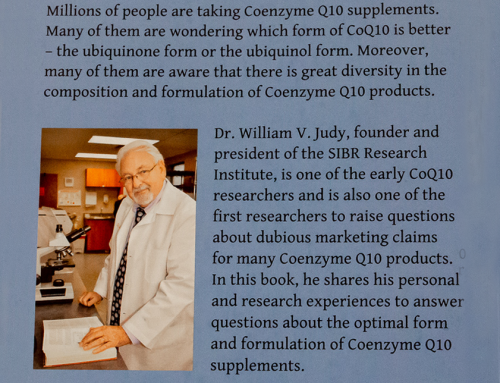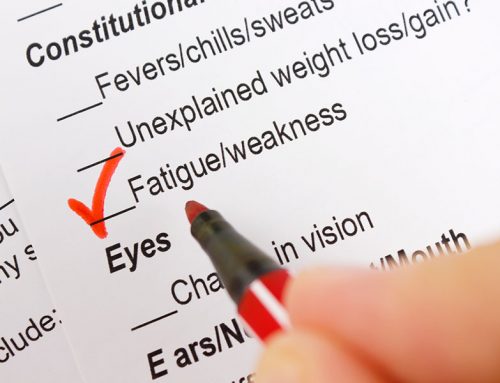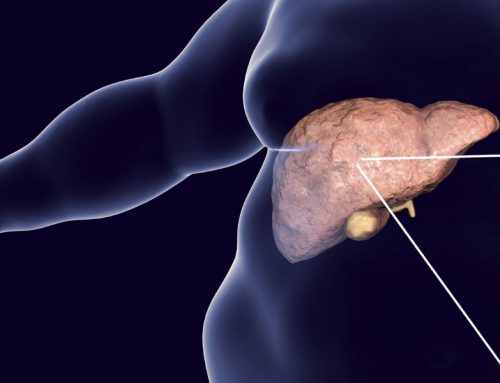
What do we know about MS? It is a disabling disease of the brain and spinal cord. It is two to three times more common in women than in men. Depending on the nerve damage, people with MS may lose the ability to walk independently. There is no cure. Fatigue and depression are common symptoms. Now, a study shows that large daily doses of Coenzyme Q10 can reduce the extent of depression and fatigue in MS patients.
Pilot study news: A new study shows that Coenzyme Q10 supplementation reduces depression and fatigue in multiple sclerosis patients. This is good news indeed. Moreover, these are research results that make sense.
We know that Coenzyme Q10 supplementation improves the symptoms of both chronic fatigue syndrome patients [Castro-Marrero 2016] and fibromyalgia patients [Cordero 2013]. At least one study has shown that Coenzyme Q10 supplementation improves the symptoms of depression [Forester 2012].
Coenzyme Q10 has anti-inflammatory and anti-oxidative stress properties [Alehagen 2015]. Inflammation and oxidative stress often accompany depression and fatigue.
The anti-inflammatory and antioxidant activity of Coenzyme Q10 may be the factor responsible for the anti-depression and anti-fatigue effects of the supplementation [Sanoobar 2016].
Coenzyme Q10 and depression and fatigue in MS patients
What was the design of the Sanoobar study of the effect of Coenzyme Q10 supplementation on depression and fatigue in MS patients?
Randomized controlled trial of Coenzyme Q10 supplementation and MS
First of all, the Sanoobar study was a randomized, double-blind, placebo-controlled study. It was designed to eliminate as many sources of misleading bias as possible.
The study participants in the Coenzyme Q10 and MS study
48 patients diagnosed with MS were randomly assigned to an active Coenzyme Q10 treatment group or to a matching placebo group, 24 patients in each group. 22 of the 24 patients in the Coenzyme Q10 completed the study; 23 of the 24 patients in the placebo group completed the study.
The patients were predominantly women; there were only two men in each group.
The average age of the patients in the Coenzyme Q10 group was 33 ± 7 years. In the placebo group, the patients averaged 30 ± 7 years.
The average duration of the disease in the study participants was 5 years.
For obvious reasons, the researchers excluded the following categories of MS patients from participation in the study:
- MS patients taking antioxidant supplements
- MS patients taking vitamin and mineral supplements
- MS patients taking anti-depressants
- MS patients taking fatigue modulating drugs
Duration of the Coenzyme Q10 and MS study
The study lasted 12 weeks. At the beginning of the study and then again after 12 weeks of supplementation, the researchers evaluated the patients using the Beck Depression Inventory and the Fatigue Severity Scale.
Dosage used in the Coenzyme Q10 and MS study
The researchers administered a daily dosage of 500 milligrams of Coenzyme Q10 to the patients in the active treatment group.
Their decision to use 500 milligrams daily was influenced by earlier research that had shown the following results:
- 60 milligrams of Coenzyme Q10 per day was too little to improve antioxidant activity [Lee 2012].
- 150 milligrams of Coenzyme Q10 per day did reduce levels of inflammation and did improve antioxidant activity in patients with coronary artery disease [Lee 2012].
- 400 milligrams of Coenzyme Q10 per day reduced the severity of depression symptoms in elderly adults with geriatric bipolar depression [Forester 2012].
In two separate journal articles, Dr. Sanoobar and his colleagues published results documenting the beneficial health effects of taking 500 milligrams of Coenzyme Q10 daily for 12 weeks:
- decreased levels of bio-markers for inflammation
- decreased levels of bio-markers for oxidative stress
- increased levels of the antioxidant enzymes catalase, superoxide dismutase, and glutathione peroxidase [Sanoobar 2016]
Results of the Coenzyme Q10 and MS study
The analysis of the data from the Beck Depression Inventory and the Fatigue Severity Scale showed significant decreases in depression and fatigue scores in the Coenzyme Q10 treatment group as compared to the placebo group [Sanoobar 2016].
A well-formulated and tested Coenzyme Q10 supplement has much to recommend it:
- It is safe and effective.
- It is simple to take
- It is inexpensive.
- It is necessary to replace the age-related loss of endogenous Coenzyme Q10.
Sources
Alehagen, U., Lindahl, T.L., Aaseth, J., Svensson, E., Johansson, P. (2015). Levels of sPselectin and hs-CRP decrease with dietary intervention with selenium and Coenzyme Q10 combined: a secondary analysis of a randomized clinical trial. PLoS ONE 10(9): e0137680. doi:10.1371/journal.pone.0137680
Castro-Marrero, J., Sáez-Francàs, N., Segundo, M. J., Calvo, N., Faro, M., Aliste, L., & Alegre, J. (2016). Effect of coenzyme Q10 plus nicotinamide adenine dinucleotide supplementation on maximum heart rate after exercise testing in chronic fatigue syndrome – A randomized, controlled, double-blind trial. Clinical Nutrition (Edinburgh, Scotland), 35(4), 826-834.
Cordero, M. D., Alcocer-Gómez, E., de Miguel, M., Culic, O., Carrión, A. M., Alvarez-Suarez, J. M., & Sánchez-Alcazar, J. A. (2013). Can Coenzyme Q10 improve clinical and molecular parameters in fibromyalgia? Antioxidants & Redox Signaling, 19(12), 1356-1361.
de Bustos, F., Jiménez-Jiménez, F. J., Molina, J. A., Gómez-Escalonilla, C., de Andrés, C., del Hoyo, P., & … Arenas, J. (2000). Serum levels of coenzyme Q10 in patients with multiple sclerosis. Acta Neurologica Scandinavica, 101(3), 209-211.
Forester, B. P., Zuo, C. S., Ravichandran, C., Harper, D. G., Du, F., Kim, S., & … Renshaw, P. F. (2012). Coenzyme Q10 effects on creatine kinase activity and mood in geriatric bipolar depression. Journal of Geriatric Psychiatry And Neurology, 25(1), 43-50. doi:10.1177/0891988712436688
Lee, B., Huang, Y., Chen, S., & Lin, P. (2012). Coenzyme Q10 supplementation reduces oxidative stress and increases antioxidant enzyme activity in patients with coronary artery disease. Nutrition (Burbank, Los Angeles County, Calif.), 28(3), 250-255. doi:10.1016/j.nut.2011.06.004
Sanoobar, M., Dehghan, P., Khalili, M., Azimi, A., & Seifar, F. (2016). Coenzyme Q10 as a treatment for fatigue and depression in multiple sclerosis patients: A double blind randomized clinical trial. Nutritional Neuroscience, 19(3), 138-143. doi:10.1179/1476830515Y.0000000002
Sanoobar, M., Eghtesadi, S., Azimi, A., Khalili, M., Khodadadi, B., Jazayeri, S., & Aryaeian, N. (2015). Coenzyme Q10 supplementation ameliorates inflammatory markers in patients with multiple sclerosis: a double blind, placebo, controlled randomized clinical trial. Nutritional Neuroscience, 18(4), 169-176. doi:10.1179/1476830513Y.0000000106
Sanoobar, M., Eghtesadi, S., Azimi, A., Khalili, M., Jazayeri, S., & Reza Gohari, M. (2013). Coenzyme Q10 supplementation reduces oxidative stress and increases antioxidant enzyme activity in patients with relapsing-remitting multiple sclerosis. The International Journal of Neuroscience, 123(11), 776-782. doi:10.3109/00207454.2013.801844
Zahednasab, H., Mesbah-Namin, S. A., & Balood, M. (2015). Coenzyme Q10 supplementation and multiple sclerosis. Nutritional Neuroscience, 18(4), 192. doi:10.1179/1476830514Y.0000000126
Disclaimer: The information presented in this review article is not intended as medical advice and should not be construed as such.







Leave A Comment